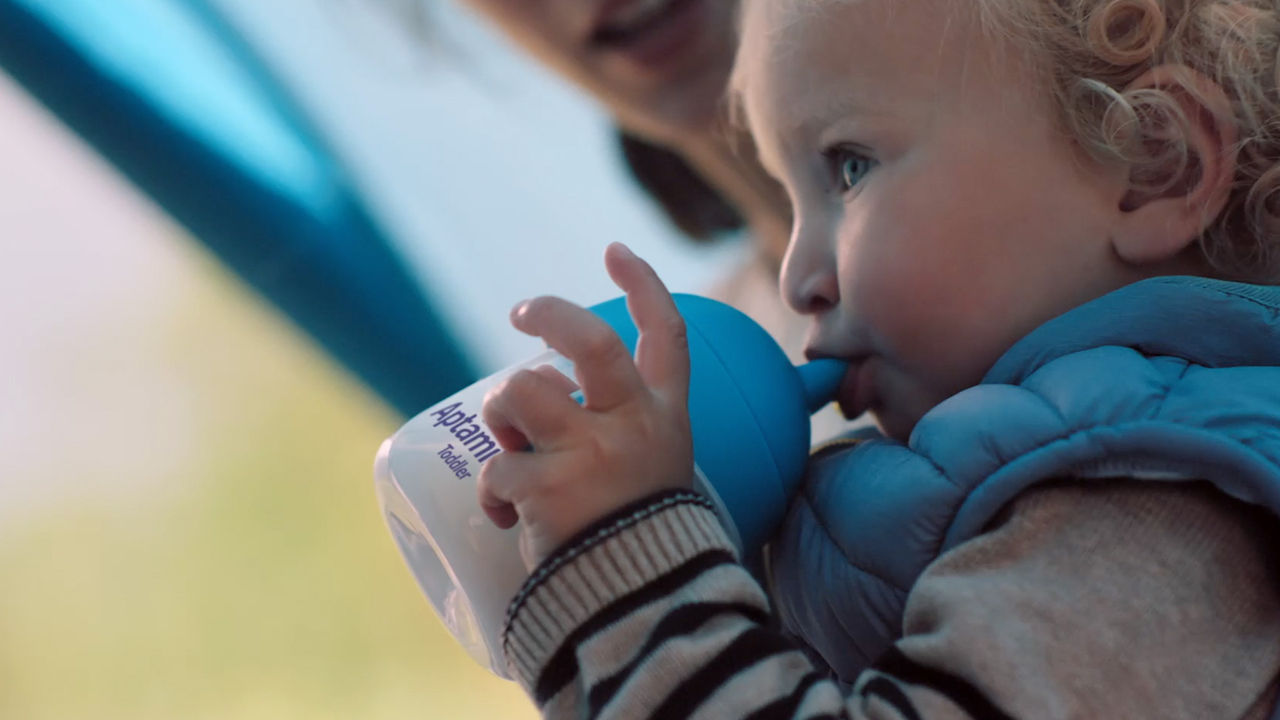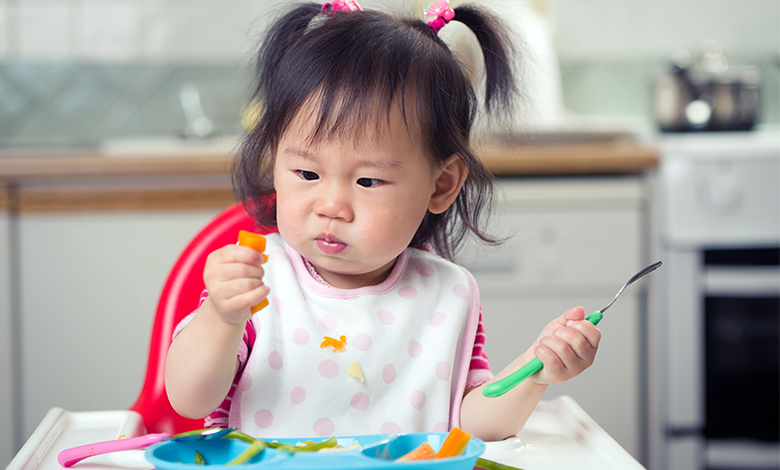- Your baby’s appetite may slow down as physical growth begins to slow.
- Daytime naps may consolidate into one session a day.
- Fine motor skills and mobility continue to develop.
- Babies’ sociability might increase during this period, even if some separation anxiety may remain.
- You may hear your baby’s first words!
Your Baby's 10 Month Developmental Milestones

Key points
Congratulations - your baby has now hit their 10 month mark! By this age, your little one may feel as if they are developing at great speed. Many babies may show increasing mastery at standing, crawling, and even self-feeding, as they take baby steps towards their first birthday. Your baby may babble to you often; you might even hear their first word!
There are a variety of 10 month old milestones you and your baby can look forward to, which we will explore in this guide.
At 10 months, your little one might be experiencing the joy of discovering all sorts of new flavours and textures; they may get excited to try what you are eating too! Trial runs are important, so if your baby's curiosity is piqued, try to introduce only one new food at a time and gauge their reaction.
Continue offering foods from the 5 major food groups to help your baby develop a balanced, nutritious diet. This includes:
● Grains and cereal.
● Lean meat, fish, poultry, well-cooked eggs and other meat alternatives.
● Vegetables.
● Fruit.
● Dairy, like yoghurt, and cheese.
Most babies can eat a variety of soft foods by 10 months. However, it is still advised to avoid honey before their first birthday[1] . Honey contains certain spores that are harmless to adults but may pose a botulism risk for your child.
During this stage, some babies love to expand their palate while others might be more interested in playtime. Similarly, some children will prefer a greater amount of solid foods than others. Your child might even become pickier with their food or start eating less during this period as their physical growth begins to slow down.
This is completely natural. 10 months remains an age where it can be more helpful to let your baby follow their feeding instincts, rather than parents pushing for a predetermined amount of food or drink per meal.
You may also notice your baby putting their developing fine motor skills to good practice! Self-feeding can become common during this period, and this is an excellent time to praise and encourage your little one as they become more confident in these motions. It can be helpful to lay out some sheets or cloth around the dining area to catch any errant spills during such practice sessions.
If you are concerned about allergies or your baby's dietary intake, contact your doctor, child health or Well Child nurse for advice.
Breastfeeding
By the 10 month mark, your baby might be getting used to a variety of soft finger foods as they gradually transition from breastfeeding to solids. However, breast milk remains a vital source of nutrients for your baby's development at this stage.
Take your time to introduce solid foods; rushing your little one can cause them to miss out on important nutrition. Ensure every meal contains both soft finger foods and breastfeeding for optional nutritional balance.
If you have any concerns about your baby's weight or nutritional intake, contact your doctor, child health or Well Child nurse or healthcare professional. They can help you explore options such as meal plans to support your child's development.
By this age, your baby may be developing a more consistent sleep schedule. During this time, most babies continue to take two naps a day.
This can look like 3 to 4 hours in the day and roughly 12 to 15 hours through the night.
Establishing a bedtime routine is crucial for building good sleep habits for your baby. To help them settle down for a peaceful snooze, it is important to:
● Make sure the environment is quiet and dark.
● Check if your baby is comfortable.
● Give them their favourite toy or blanket if they usually sleep with one.
● Try sticking to a consistent settling, sleeping, and waking time.
Illness, teething , and growth spurts may be factors that keep your little one restless at night or otherwise unable to fall asleep. Separation anxiety may also be at play. This is quite common for 10 month olds to experience as their emotional and cognitive abilities continue to develop.
Once they have recognised you as a primary caregiver, many babies this age may become anxious if they do not sense you nearby. Fortunately, separation anxiety is often temporary and may be relieved by:
● Stay with your little one until they are asleep, before quietly leaving them.
● Always saying goodbye, offering extra cuddles and comfort.
● Providing extra day cuddles/play time to give them the chance to be close.
If your baby shows signs of anxiety such as clinging, crying, or fussiness, it is important to stay with them until they fall asleep. Leaving them to cry alone may lead to attachment issues so reassure your little one with your presence as they settle down for the night.
It is not unusual for babies to stir during the night or experience some separation anxiety as they continue to develop. However, if you are concerned that they are waking a little too much or struggling to fall asleep, this is a good time to contact a GP, nurse, midwife or healthcare professional to seek professional advice.
At 10 months, there are a few key developmental milestones you might want to keep an eye out for as your baby slowly transitions into their toddler years.
While it is important to celebrate these moments in your little one's life, it is also important not to compare their growth with other babies their age. Children develop at their own pace, and your baby's journey is as unique as they are!
Physical
By this stage, your baby is likely to be very physically active. You may find yourself chasing your little one around the house as they excitedly explore their world with the mobility they have steadily built over the past 10 months.
During this period, your baby might be able to:
● Pull themselves up unassisted.
● Sit upright without toppling over or leaning sideways.
● Crawl with increased mobility.
● Take their first few steps.
● Walk around using furniture to support themselves, or ‘cruising’.
● Walk with you while holding both your hands.
● Hold a bottle or drink from a cup with assistance.
● Try to hold a spoon if they are feeding themselves.
● Clap their hands and wave ‘bye-bye’.
Keep in mind that every child develops differently, and it’s okay if your little one isn’t checking off everything on this list. Use this as a guideline and enjoy the moments of your baby's unique journey together!
Cognitive
At the 10 month mark, your baby's cognitive development continues to improve along with a blossoming curiosity. Many babies show great interest in discovering how things work and may enjoy grabbing things to inspect or throw them.
Your baby might also look for hidden objects more often as their understanding of object permanence deepens.
By this age, your little one may enjoy bouncing along to music and mimicking speech sounds. You might notice that they can follow simple instructions paired with visual cues. Your baby may also find it easier to pick objects up with their thumb and pointer finger in a pincer grasp.
Emotional
By this time, you might notice your baby developing a sense of caution or new fears. This could be anything from the sound of a vacuum cleaner to the laundry machine. Give them a cuddle, or another form of comfort you know they will appreciate, to help your little one feel safe again.
Communication
This is an exciting period where many parents may notice significant development in their baby's communication skills. Conversations can really pique your little one's interest, and they may even join in singing songs.
Body language, facial expressions, and babbling are ways through which your baby may communicate their wants and needs with you. By listening and responding to the noises they make in a warm and loving tone, you can help them build important language and communication skills. This exercise can also be highly entertaining for many babies, who may enjoy the rise and fall of your voice.
Keep an ear out; you might even hear your baby's first words!
Social
Your baby might be very social at this age, despite potential bouts of separation anxiety. While initial shyness around strangers is common, some babies this age enjoy interacting with new people and even more so with their loved ones. If your little one is open to it, you can encourage their developing social skills through playtime and cuddles.
Milestones to monitor
Like all babies, your little one's development journey is uniquely their own. However, you may wish to consult a doctor if your child:
● Shows no response to parents or primary caregivers.
● Does not make eye contact or track moving objects with their eyes.
● Cannot babble, vocalise, or make sounds.
● Shows no interest in holding toys or throwing small objects.
● Cannot sit up or pull themselves into a standing position unassisted.
● Relies heavily on using one side of the body over the other.
● Does not play with their feet or pass items between their hands.
● Is not learning to eat solids.
Play and exploration are integral ways through which your little one builds foundational skills and explores the world with their developing senses. Here, they are learning to interact with themselves, others, and the environment through fun and engaging methods.
Playtime is also one of the most effective and enjoyable ways you can deepen your bond with your baby. This can look like:
● Singing songs and nursery rhymes together.
● Reading books with simple stories and colourful images with high visual impact. This helps babies develop a solid foundation for reading, writing, and overall literacy skills.
● Telling stories and narrating the world around your little one can encourage their imagination and ability to communicate. Pairing this with dynamic facial expressions can also entertain babies this age and help them understand emotional cues.
● Making funny noises and animal sounds with your baby. You can also explore toys that provide stimulating auditory features such as squeaky plush animals.
● Playing with toys that have a 'surprise' element, such as jack-in-the-boxes, can be enjoyable at this age. You can also try to hide toys and help your baby find them as their understanding of object permanence deepens.
● Encouraging movement and muscle development through games such as rolling a ball between the both of you, or crawling with them on the floor.
● Playing repetitive games such as peek-a-boo or patty cake.
Baby-proofing your house becomes essential at 10 months as your baby's curiosity reaches new heights. This will look different for every child and individual household.
However, taking simple precautions such as locking away hazardous cleaning solutions or padding sharp edges on furniture can be a good start to creating a safe environment for your little one.
Outdoor play is also a fantastic way to introduce your baby to different environments and experiences. This is important for baby development, and your little one may enjoy discovering fresh sensations with an influx of new things to see, smell, and touch.
Before embarking on any outdoor adventures, always take sun-safe precautions and provide adult supervision to minimise any risks. Otherwise, enjoy these moments with your child as they explore the exciting world around them with you at their side.
For 10 month old babies, there are no particular immunisations or check-ups to be aware of at this age unless you are catching up with previously missed vaccinations. However, this is a time when your baby may experience their first or second cold. This is quite normal, particularly if they have started daycare.
If your baby catches the flu, follow your daycare's guidelines for keeping sick children at home and take note of their symptoms. Fevers can make your little one quite uncomfortable but high temperatures are not necessarily an accurate indicator of the illness' severity.
Instead, it may be helpful to focus on signs such as lethargy, dehydration, extreme fussiness, or unusual behaviour such as tugging at their ear in a way that causes pain.
For fevers that persist longer than 24 hours or do not respond to medication, it may be time to contact your doctor for guidance.
Self-care tips for parents
It has been an eventful past 10 months, full of unforgettable memories and adventures. By this stage, you may have found various ways to weave self-care back into your routine through trial and error. You deserve to celebrate how far you have come!
Here are some tips to help you out on your self-care journey:
● Go outdoors to enjoy fresh air and sunlight, even for a moment.
● Exercise regularly in the gym or through at-home videos, classes, and social sports.
● Eat a balanced diet and stay hydrated throughout your day.
● Establish a calming bedtime routine and get as much sleep as possible.
● Take a moment to meditate or journal about your feelings and experiences.
● Practise gratefulness; identify 3 things you are grateful for before you go to bed.
● Reconnect with loved ones through outings, phone calls, or online messages.
If you are feeling overwhelmed and anxious, remember that you are not alone. There are many parents, families, and caregivers who know exactly what you are going through and would love to support you from a place of experience.
During these rough moments, you might find it helpful to reach out to professional services including your GP, family support groups, helplines such as the Australian Perinatal Anxiety & Depression (PANDA) Helpline, and many more.
We’re here to help
Our team of nutritionists, dietitians and midwives at Careline are healthcare professionals with big hearts. Specialising in infant and child health, they offer parents and carers, free nutrition, feeding and product advice and lots of moral support. Contact our Careline Experts by phone, LiveChat or email.
Always consult your doctor, midwife or healthcare professional for advice about feeding your baby.
Every feeding journey is unique
Not every parent can breastfeed. Not every parent can produce breast milk. No matter what choice you make, we will support your unique feeding journey.
We at Nutricia believe in providing the best nutrition for babies, which is why we recognise breast milk as uniquely superior for babies, it provides many benefits. It is important that mums have a healthy diet to support breastfeeding. A decision not to breastfeed, or partial bottle feed, may reduce breast milk supply making it difficult to reverse. The cost and social implications of using feeding methods should be considered. Always seek professional for advice about feeding your baby. Ensure formula is used as directed as improper use can affect baby’s health.
Please note: These articles are meant to give you a general sense of the growth and development of your newborn baby. However, it’s important to remember that every baby grows and develops at their own pace. This article is not a substitute for medical advice. Always speak to your healthcare professional about any concern you have concerning your child.
Raising Children Network. Development Tracker: 9-10 Months [Internet]. [cited 2024 January 9]. Available from: https://raisingchildren.net.au/babies/development/development-tracker-3-12-months/9-10-months
Pregnancy, Birth & Baby. Baby's Growth and Development: 10 Months Old [Internet]. [cited 2024 January 9]. Available from: https://www.pregnancybirthbaby.org.au/babys-growth-and-development-10-months-old
Pregnancy, Birth & Baby. Separation Anxiety [Internet]. [cited 2024 January 9]. Available from: https://www.pregnancybirthbaby.org.au/separation-anxiety
The Royal Children's Hospital, Melbourne. Home Safety Fact Sheets [Internet]. [cited 2024 January 9]. Available from: https://www.rch.org.au/kidsinfo/fact_sheets/Home_Safety/
PANDA - Perinatal Anxiety & Depression Australia. PANDA Helpline Programs [Internet]. [cited 2024 January 9]. Available from: https://raisingchildren.net.au/_media/external-links/p/panda-panda-helpline-programs
Health Direct. Botulism [Internet]. [cited 2024 February 27]. Available from:
https://www.healthdirect.gov.au/botulism

Get in touch with our Careline experts
When your little one is unhappy or unwell you want reliable support from a trusted source. Our Careline team of nutritionists, dietitians and midwives specialise in infant and child health, offering free nutrition, feeding and product information.



